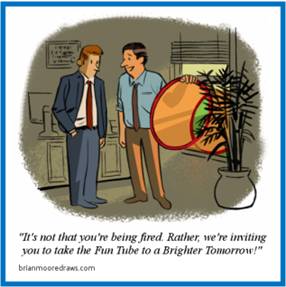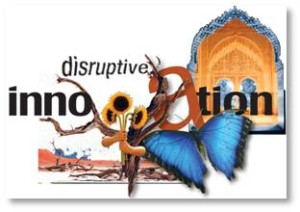Monday Author: Susanne Skinner
Corporate ridiculousness exists. Fellow bloggers and writers are raising awareness of ageism in the workforce by exposing the tech world’s ridiculous obsession with a young, somewhat clueless labor force. The latest expose’ is a local story, calling out Cambridge, Massachusetts-based HubSpot.
In his book “Disrupted,” veteran writer Dan Lyons dishes on the management and culture cult he experienced working in this self-proclaimed disruptive company. The label is not unique.
Disruptive Innovation a product or service that begins at the bottom of a market and rises quickly to steamroller established competitors) is a concept that’s been misapplied for over 15 years. Saying it does not make it so.
Taking Down a Specific Culture
Lyon’s book is a harsh take down of the start-up environment and a very specific type of culture. It critiques one that sings a disruptive siren song to college grads who believe free candy and bouncy-ball seats are all that’s required to create disruptive innovation. It’s about ignoring the value of age and experience and the industry’s inability to recognize either as essential to disruptive success. They are too busy high-fiving themselves to see what they’ve overlooked.
The high-tech industry is full of companies that hire incompetent management and a delusional workforce. Then they seduce them into endless workdays with a beer fridge and foosball table. It’s the new standard of awesomeness for young job seekers; blinding them to what lies ahead.
Before long they burn out. They quit or get tossed aside (HubSpot uses “graduated” instead of “fired”) before their investment pays out. It leaves them with nothing to show for it and no life to go back to.
Disruptive Innovation Myths
Mr. Lyons did not sit on the sidelines when he wrote his book; he was a HubSpot employee for almost two years. A 52-year-old veteran of Newsweek; he suddenly found himself referred to as Grandpa in an office playground full of twenty-something white men. His story extends beyond the culture of one company and speaks to the vast gulf between age, experience and false promises that make a handful of executives very wealthy.
 These same executives are skilled at the game of smoke and mirrors, making young people believe they will get rich because they are special and have superpowers.
These same executives are skilled at the game of smoke and mirrors, making young people believe they will get rich because they are special and have superpowers.
Convinced they will change the world; they don their company tee shirt and drink the Kool Aid.
Some of us know better. Options don’t matter if you or the company go up in flames. Young people are not the ones that guide you to the high-tech finish line and a sustainable product.
Innovation and Culture
It is a common misconception that technical disruption alone brings about change. A company that is truly innovative also understands culture. They know it’s not created by executives who think a nap room and free snacks attract the best hires.
A healthy culture is the result of good leadership and strategic vision, with an investment in talented people of all ages and backgrounds. This is what creates change, disrupts industries and leads innovation. A diversified workforce sustains a culture of collaboration and excellence. People, not companies create disruptive innovation.
In addition to developing leading-edge technology, a disruptive company understands their buyer’s journey and their own differentiators. If they are unable to articulate either with clarity, they are pretenders to the throne.
Disruptive Innovation Reality
I am a disciple of Malcom Gladwell, a staff writer for the New Yorker, prolific author and speaker. If you haven’t experienced him (or his hair), treat yourself to a TED talk or visit his blog.
 In his book Outliers, The Story of Success, Gladwell says it takes roughly ten thousand hours of practice to achieve mastery in a given field. Once your education is complete you need to invest an additional five or even ten years to become good at what you do.
In his book Outliers, The Story of Success, Gladwell says it takes roughly ten thousand hours of practice to achieve mastery in a given field. Once your education is complete you need to invest an additional five or even ten years to become good at what you do.
Deep Experience Needed
Companies who reject the seasoned workforce fail to recognize all those hours of expertise belong to employees who are really good at what they do. Strong leadership qualities established professional networks and loyalty do not come with the very young. They lack staying power and the experience to know what works and what doesn’t.
The Sloan Center on Aging & Work at Boston College reports that by 2019, workers 55 and older (or as I like to call them, people with deep experience and extensive industry knowledge) will comprise 25 percent of the workforce. As the economy gains momentum so will the job market. By 2030 there will be a shortage of younger workers to fill these positions as millions of boomers leave the workforce.
Disruptive Success
Experience should be as highly valued as age. Yet many companies believe the young are the only key to disruptive innovation. 27% of employees in companies under five years old are between 25 and 34. 90% of these companies will fail — the result of many factors including their founders’ inexperience.
One analysis of failed disruptive startups revealed poor market knowledge or an inappropriate business model as their downfall. They lacked the seasoned management that startups need to understand and withstand market fluctuations and the experience to navigate them.
Age as a Liability
Despite regulations from the Equal Employment Opportunity Commission that forbid discrimination against workers over the age of 40, this age group is overlooked. They are considered a liability even though it’s not politically correct to say so, since that would be actual discrimination.
Unless you’re HubSpot CEO Brian Halligan — quoted as saying he is “trying to build a culture specifically to attract and retain Gen Y’ers because, in the tech world, gray hair and experience are really overrated.” Yes. Yes, he did. Perhaps he doesn’t know who Warren Buffet is.
There is room for everyone. When employers tap into the resources of an experienced workforce, aligning them with Millennials and Gen Y’ers, they build an open and transparent culture that connects programs with strengths. Seasoned managers provide mentoring and training. Younger generations bring much-needed technology shifts to the way business is conducted. That’s a disruptively winning combination.

